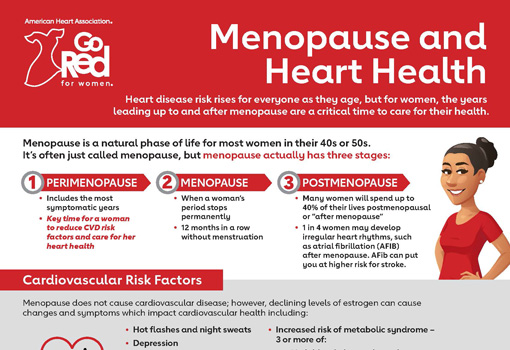Menopause and Women's Health

Menopause — the time in women's lives when menstruation ceases — is a normal phase of a woman’s life for most women in their 40s and 50s. Menopause can’t be prevented and every woman will experience.
The approach of menopause marks a point in midlife when women's cardiovascular risk factors can accelerate and focusing on overall health is crucial.



What is menopause?

Does Menopause cause Heart Disease or Stroke?
How does Menopause affect Estrogen Levels?
Throughout a woman’s life, estrogen levels will rise and fall. For example, estrogen levels are higher during puberty and pregnancy and lower following childbirth, during breastfeeding and after menopause.
Here's information on estrogen and hormone therapy for every woman to discuss with her health care team.

Your Health and Menopause
How Can I Stay Healthy Before Menopause?

The years leading up to menopause are a critical time to prevent cardiovascular disease.
Healthy habits adopted before menopause can help reduce your risk for cardiovascular disease for the rest of your life.
How Can Early Menopause Affect my Health?

Women who experience menopause at an earlier age have a higher risk of cardiovascular disease.
Could a stroke, heart attack or other cardiovascular event in young women contribute to early menopause?
How Can I Keep My Heart Healthy After Menopause?

After menopause, a woman’s cardiovascular risk is higher than it was in pre-menopausal years.
Understand how menopause can impact your health.
Menopause and Women's Health Infographic

